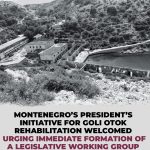
CONSTITUTIONAL COURT OVERTURNS HIGH COURT RULING ON ILL-TREATMENT IN PRISON, CITING SUSPENDED SENTENCES FOR TORTURE
21/03/2025
WE CONDEMN THE DISCRIMINATORY STATEMENTS OF IVAN MILOŠEVIĆ AND THE UNPROFESSIONAL JOURNALISTIC CONDUCT ON THE GRADSKA TV
25/03/2025INTERNATIONAL DAY FOR THE RIGHT TO THE TRUTH CONCERNING GROSS HUMAN RIGHTS VIOLATIONS AND FOR THE DIGNITY OF VICTIMS – JUSTICE FOR THE VICTIMS OF THE PAST IS THE FOUNDATION OF A SECURE FUTURE
Today is the International Day for the Right to the Truth Concerning Gross Human Rights Violations and for the Dignity of Victims, established by the United Nations General Assembly in 2010.
This day should remind us that confronting the past, acknowledging the suffering of all victims of gross human rights violations, and ensuring all forms of justice (reparations) for them is a crucial foundation of a democratic society, based on the rule of law, which responsibly builds a secure future where such atrocities will not be repeated.
Montenegro will only achieve true democratic progress by confronting the facts of its past regarding gross human rights violations.
Our state institutions must take responsibility for justice for the victims and do so urgently – from prosecuting war crimes to opening the archives of secret services and passing laws on the rehabilitation and compensation of victims of political persecution.
Without this, society will remain trapped in the denial of past crimes and the risk of repeating similar atrocities in the future.
The world we live in is full of violence, but also a lack of truth about crimes and the failure to achieve justice for victims. Over a hundred wars, both international and internal, are ongoing.
Massive human rights violations have become a harsh reality – civilians are being killed, wounded, persecuted, and displaced.
In Europe, the three-year Russian invasion of Ukraine has resulted in a significant number of casualties and injuries – 12,605 civilians have lost their lives, including 669 children, while 29,178 people have been injured, including 1,854 children.
Millions of people have been forced to leave their homes, and the economic and social consequences will be felt for a long time.
In the Middle East, the Hamas terrorist attack on October 7, 2023, in Israel, which claimed the lives of 1,200 predominantly young people, and the abduction of over 200, led to an escalation of the conflict and a humanitarian catastrophe of unimaginable proportions caused by Israel’s invasion of Gaza. According to data from the Gaza Ministry of Health, by February 2025, at least 48,348 Palestinians had been killed, including 13,319 children and 7,216 women, while 1.9 million people have been forcibly displaced. Hunger, disease, and death have become everyday realities. The International Criminal Court (ICC) has issued arrest warrants for Israeli Prime Minister Benjamin Netanyahu, former Defense Minister Yoav Gallant, and Hamas leader Ibrahim Al-Masri, accusing them of war crimes and crimes against humanity.
Although the temporary ceasefire in January 2025 brought hope, violence unfortunately escalated again.
Today marks the 26th anniversary of the start of NATO bombing of the Federal Republic of Yugoslavia (Serbia and Montenegro), during which many innocent people of Serbian, Albanian, and other nationalities lost their lives, and Serbia’s infrastructure was severely damaged. Although the NATO offensive was against the UN Charter, it was justified by the terror of the Serbian army and police against the Albanian population in Kosovo. The heavy suffering of civilians and the so-called collateral damage during that bombing (such as the attack on the Belgrade Television building, the center of Niš, Aleksinac, Murino in Montenegro) was largely not prosecuted, while the crimes in Kosovo have been to some extent clarified. The number of victims is still manipulated in the public, primarily because an official list of victims has not been made. However, one non-governmental organization, the Humanitarian Law Center, undertook this task, and its findings are available here and have not been officially denied.
Montenegro recently, after three decades, recognized the status of civilian victims through the Law on Veterans’ and Disability Protection, which represents a significant step forward. It is crucial for the Government to quickly adopt a decision on one-time compensation, rectify the historical injustice, and address the long delay in regulating the status of families of civilian victims of war.
Justice for the victims of war crimes in Montenegro remains elusive, as the crimes have not been adequately prosecuted. We expect that the new Strategy for Investigating War Crimes will not be merely a façade for the lack of will on the part of the state prosecution, as was the case with the previous one. Without justice, there can be no rule of law, no lasting reconciliation in the region, and no secure future.
Just as the status of civilian war victims has been recognized, the state should correct the injustice toward the victims of political persecution and adopt a law on the rehabilitation and compensation of prisoners from Goli Otok, Sveti Grgur, and other prisons. On Goli Otok, there were 3,390 Montenegrins, which constitutes more than a fifth of the total number of prisoners and, proportionally, the highest number relative to the population of each of the former Yugoslav republics.
It is also necessary to legally ensure the permanent opening of the files from the Informbiro period related to “internal enemies” and “internal extremists.” We call on the National Security Agency (ANB) to finally open the archives and hand over the files to the State Archives. We remind that, according to the Law on Archival Activity, all state institutions are obligated to hand over files to the State Archives of Montenegro after 30 years from the date the file was closed, and after 50 years when it pertains to materials from security services. However, the ANB has never done this. For example, the Republic of Croatia and the Republic of Slovenia have opened all secret files held by the state security services up until 1990.
The right to the truth, as stated in the UN Resolution from 2005, is crucial for victims and their families, as it allows them to learn about the fate of the disappeared, the causes of crimes, and the identities of the perpetrators. Understanding past crimes is not only important for recognizing the suffering of the victims, but also as a mechanism to prevent the repetition of such atrocities in the future.
The International Day for the Right to the Truth concerning Gross Human Rights Violations and for the Dignity of Victims was established in memory of Óscar Arnulfo Romero, the Archbishop of El Salvador, who was assassinated while celebrating Mass after condemning mass human rights violations, murders, torture during the civil war, and social injustice. No one has been held accountable for his assassination, but the memory of his struggle for a fairer society is still honored today. Human Rights Action (HRA) pays tribute to the men and women human rights defenders who lost their lives in that fight.







 English
English